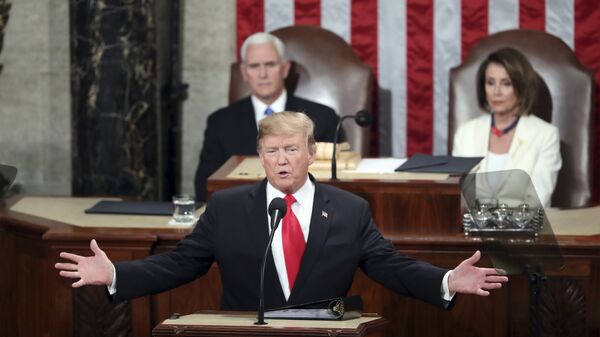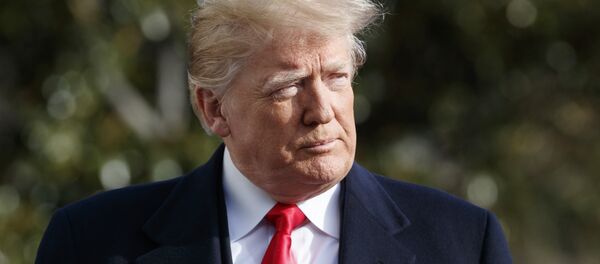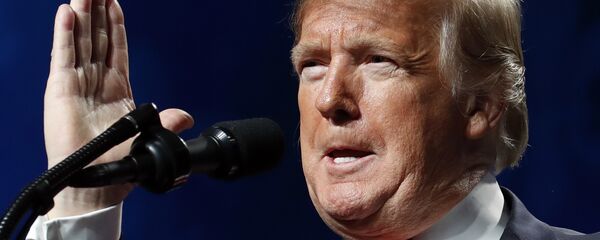Sputnik: In his speech, Donald Trump warned that ridiculous partisan investigations will harm economic progress in the United States. How grounded is his warning? Obviously, we know what he is alluding to. What's your take on his use of the words "ridiculous partisan investigations"?
Ric Simmons: I partly disagree with the idea that it's partisan, certainly. The investigation is being run by Mueller, who is a Republican; it was started by Rosenstein, who is a Trump appointee and a Republican. So, there's not much partisan about the investigation itself. As far as ridiculous, I don't know; there certainly has turned up some evidence of wrongdoing, so I understand why he said that there; he had just talked about the economic progress and wanted people to say "stop investigating me"; but I'm not sure what the connection is there between the economic progress and the investigation.
I feel like the investigations have really no partisan taint to them at this point; Democrats aren't running it, his own Department of Justice is running the investigation.
Ric Simmons: I guess that depends on the point of view. On the one hand, it hasn't shown any direct connection between President Trump himself and any interference by Russia. But it has certainly shown evidence of wrongdoing. I think we've had three or four indictments so far, including six former Trump advisers who have been indicted; we've had seven guilty pleas, including five of his former advisers, his former national security adviser and former campaign adviser; and also a number of Russian nationals and companies have been indicted as well. So it has had some success.
READ MORE: Hillary Clinton: Trump's INF Treaty Withdrawal is "Gift to Putin"
Of course, the big question is we don't know what they're going to come up with eventually; the final report hasn't been issued yet, so we really have to wait and see for the final report to see how successful it's been. But so far, it's been relatively successful in finding criminal activity within his campaign.
Ric Simmons: It's very hard to predict with this president what is going to happen or what he is going to do. I agree with you that the first 15-20 minutes of the speech were very bipartisan — he talked about WWII and landing on the Moon, things that all Americans love. But then he had a 15-minute segment in the middle where he talked about immigration, [he took] a very hard line on immigration, he kept insisting on his wall and kept talking about criminals trying to cross the border and [he used] very strong language on immigration, which is probably the most partisan divide that we have right now.
So, the speech went back and forth between these high-minded bipartisan "love America" ideas and some of his very partisan pet projects, like this wall. I think if he keeps insisting on this wall and keeps attacking Democrats for being weak in different ways, it's hard to see us getting to any kind of bipartisan agreement or breaking the stalemate. So at this stage, a couple of months into the divided Congress, we haven't seen a lot of signs that he is willing to work with Democrats to get things done.
Ric Simmons: Certainly there's a geographic divide there, I agree. Although there're certainly some border states and border districts that don't want the wall. But I do think that you're right, the southern areas, the poorer areas are going to be more likely to support Trump. Whether or not he does this national emergency declaration, it does seem like something that Trump would want to do, I'm sure his legal advisers are telling him that it's unlikely to succeed.
Legally, there's certainly going to be a lawsuit if he does this; and there're a lot of legal problems with making that declaration. I'll give you a couple: one is that the courts have to agree that there's an emergency, it's not clear there is an emergency — he keeps saying there is one, but people crossing the border illegally has been happening for decades and it's not different now than before. He also has to be able to use the military to build the wall and emergency declaration powers allow the military to do military projects, but it's not clear that it would be a military project.
READ MORE: ‘Nationalistic, Divisive, Hateful': Trump's SOTU a Preview of 2020 Campaign
There's also a problem with appropriating funds that Congress hasn't given him. So, there're a lot of legal issues surrounding this that he might not be able to overcome. On the other hand, the Supreme Court has been very deferential to the president on questions of national security. We had this travel ban that he put into place that seemed pretty clearly to be religious discrimination; but the Supreme Court upheld that last year, saying that the president gets wide discretion on national security issues. Again, it's hard to predict, but I could see at least a year or two of legal wrangling over this before the courts finally decide whether he can build the wall that way or not.
The views expressed in this article are solely those of Ric Simmons and do not necessarily reflect the official position of Sputnik.




